Bible Class 04
Chris Knepp

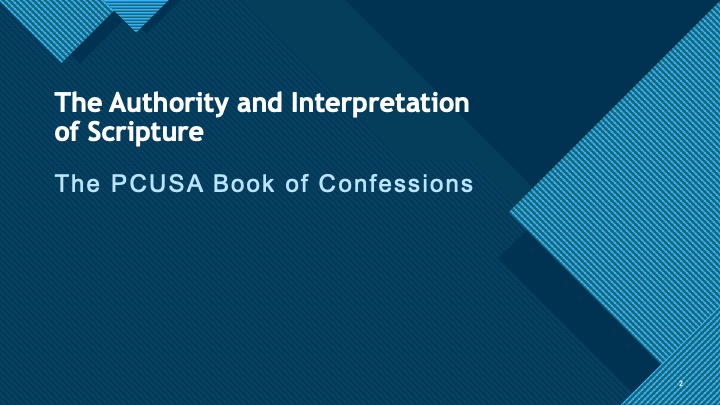
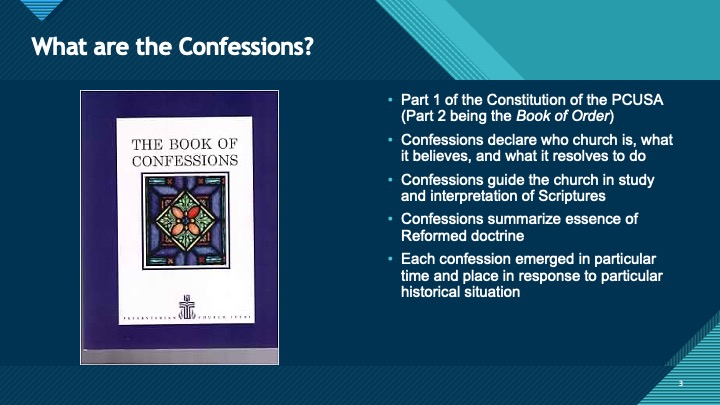
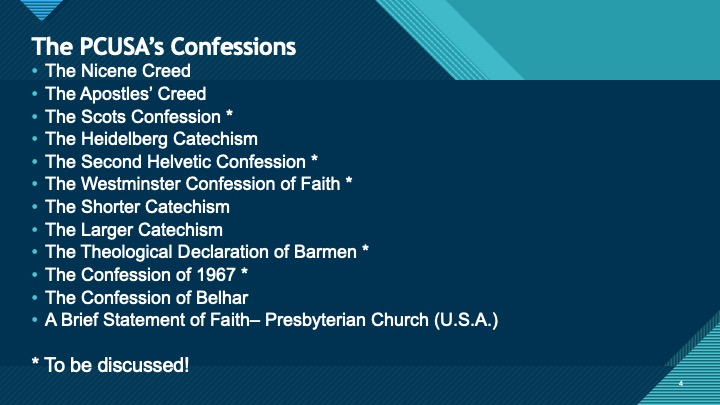
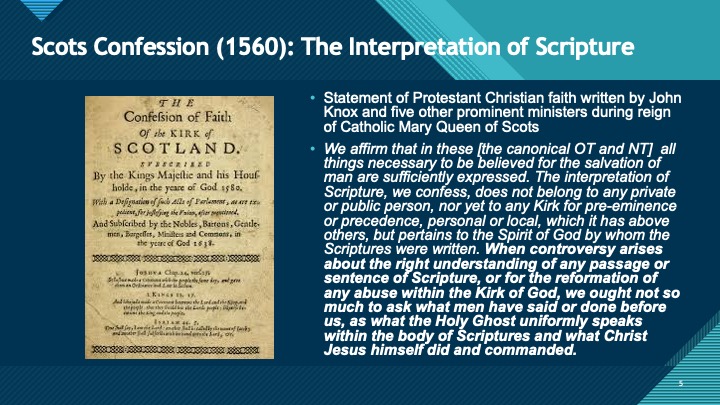
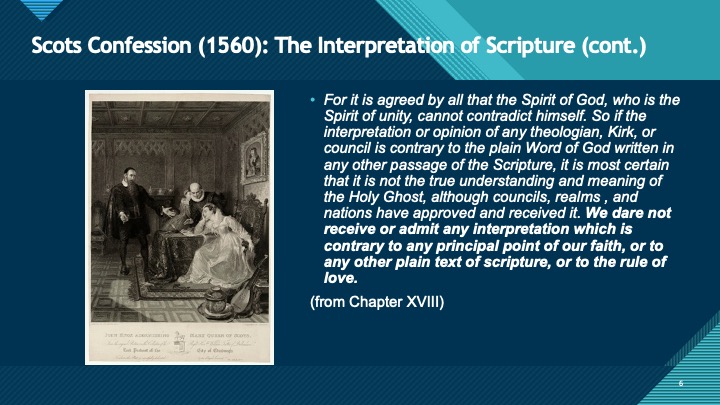
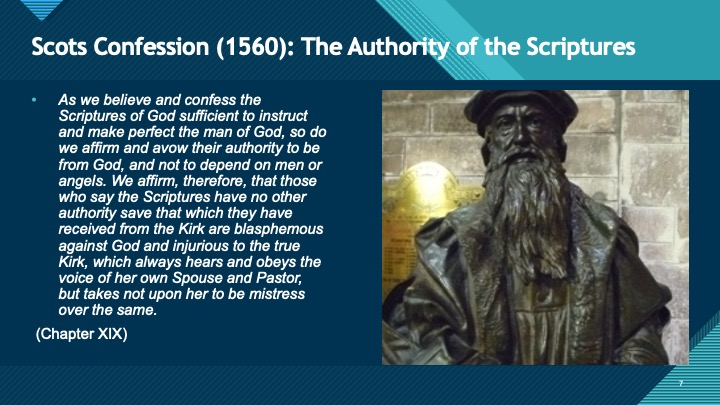
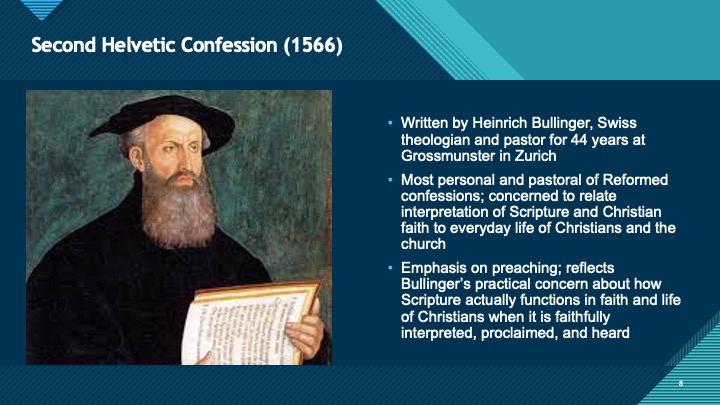
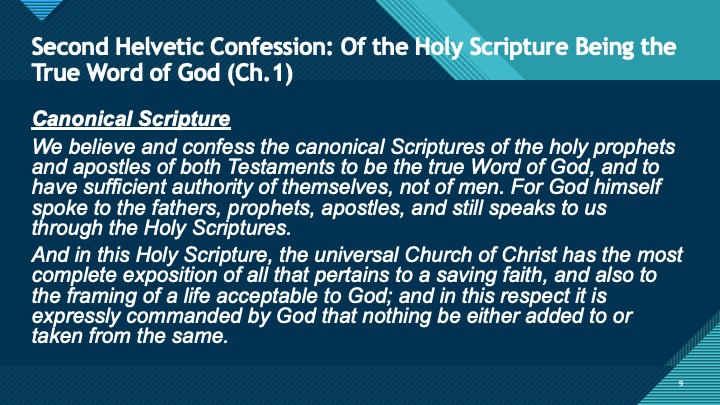
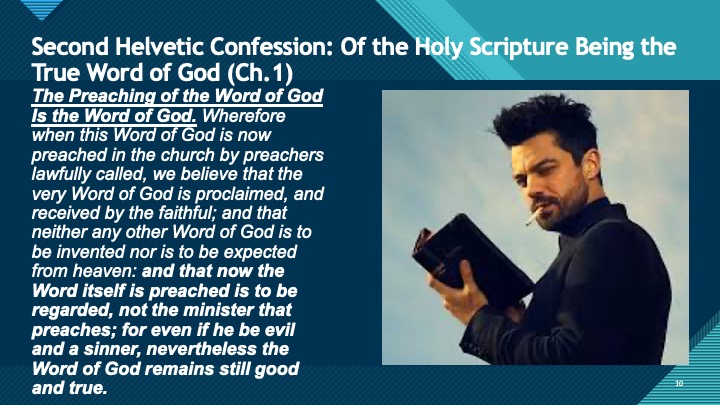
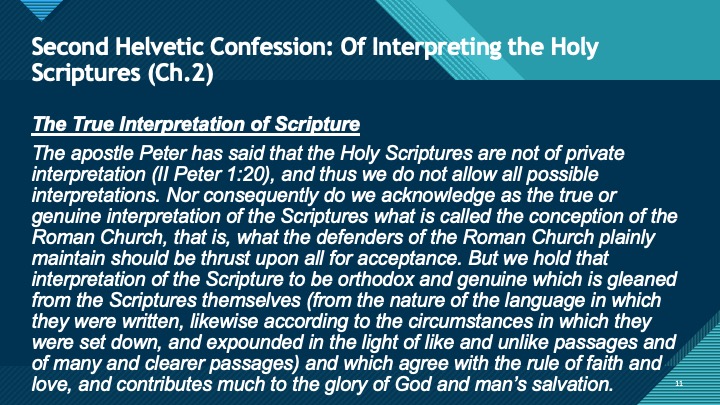
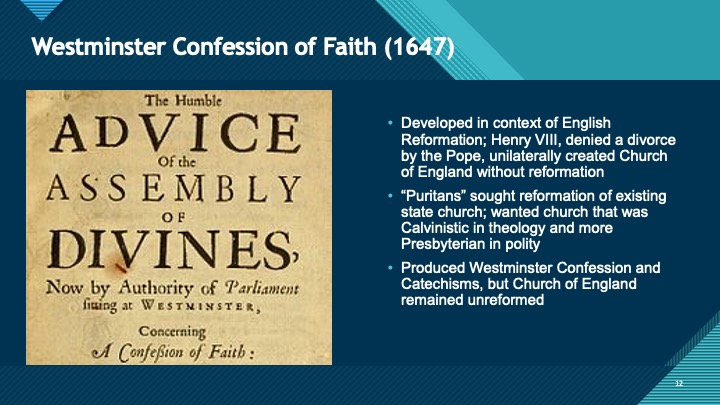
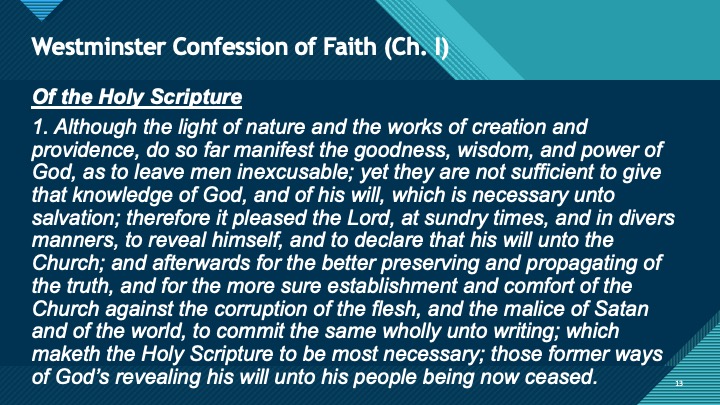
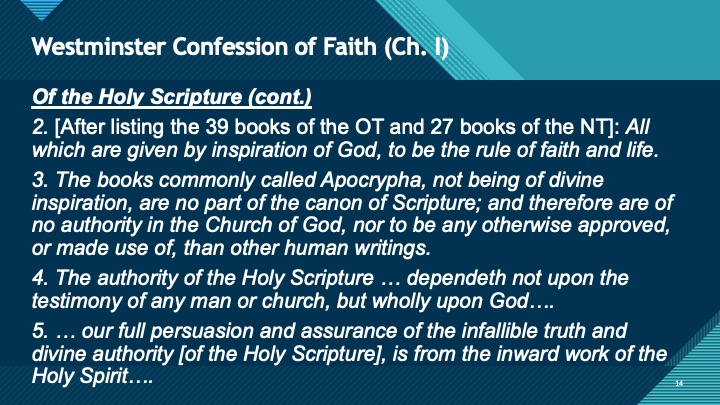
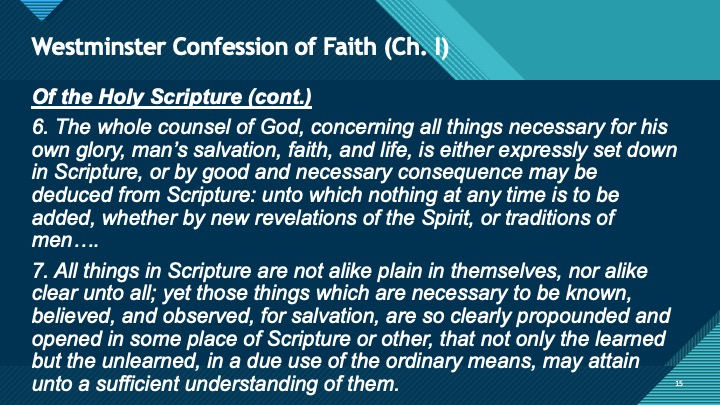
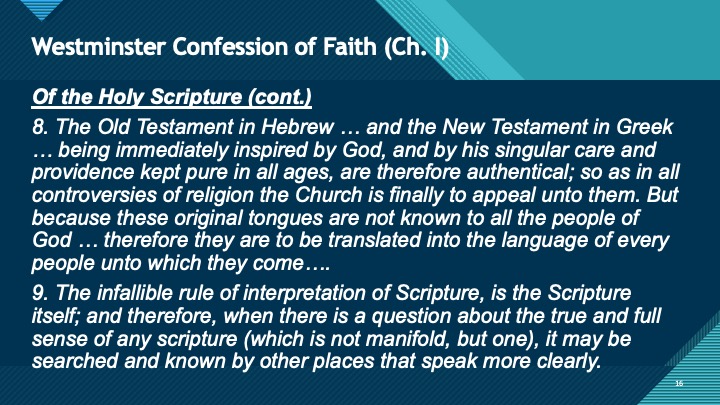
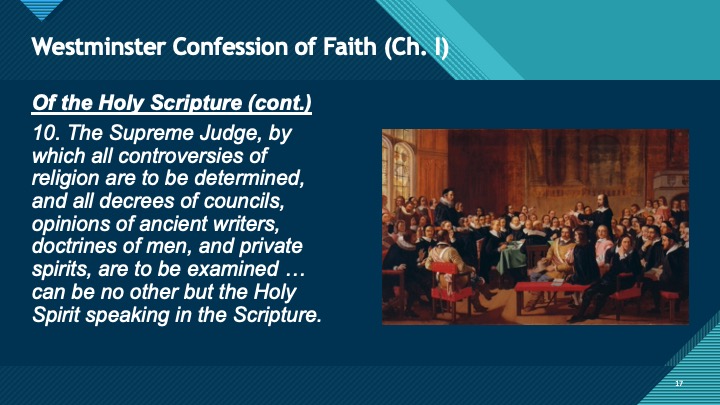
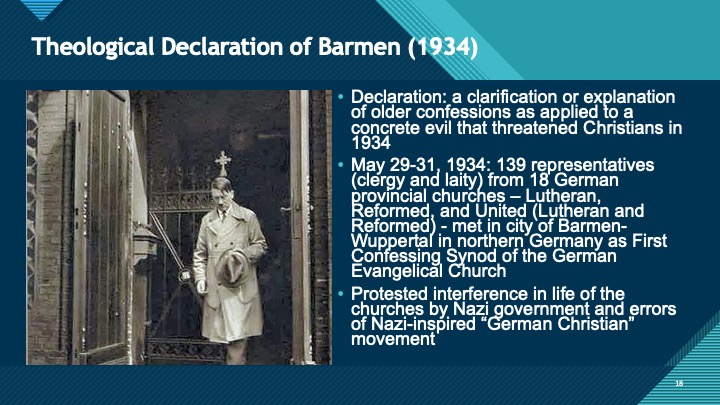
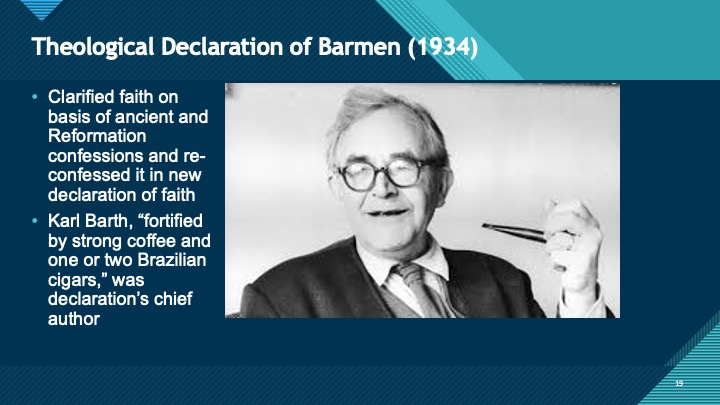
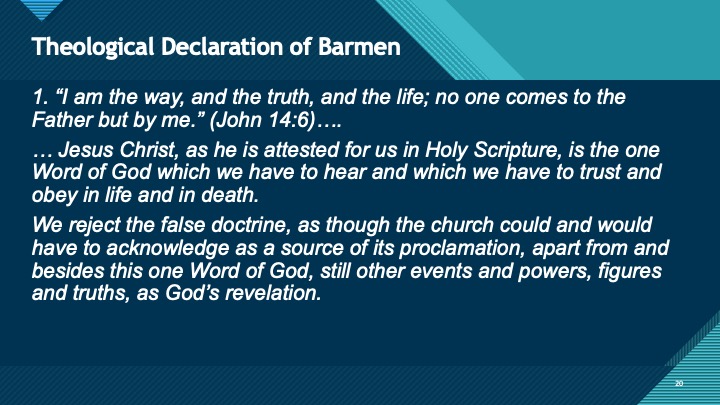
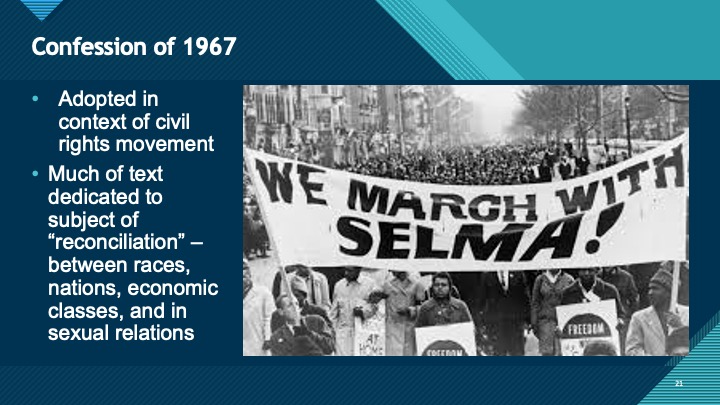
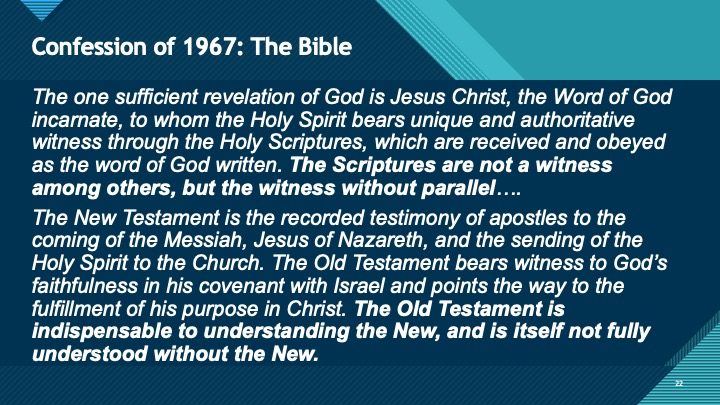
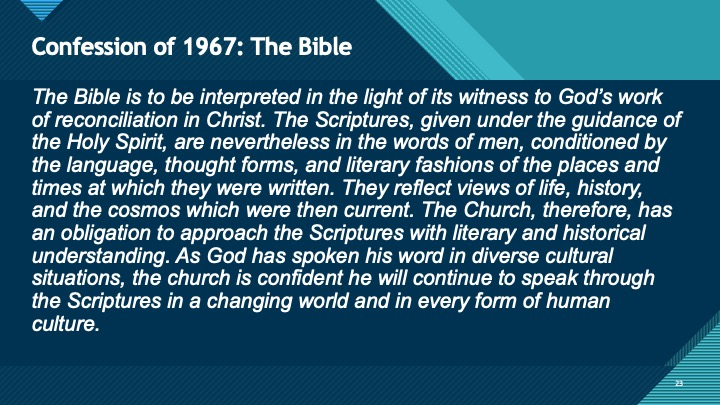
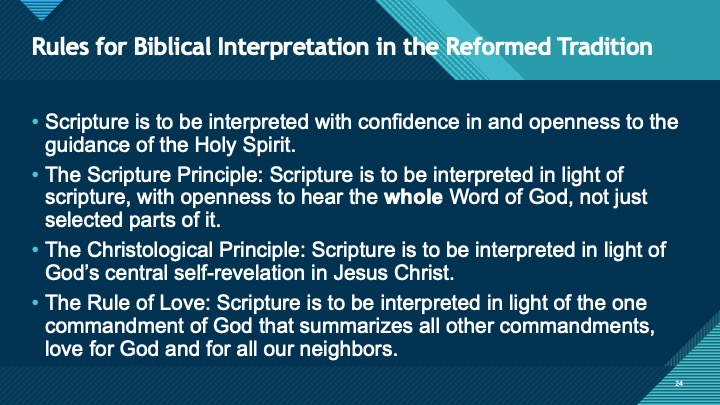
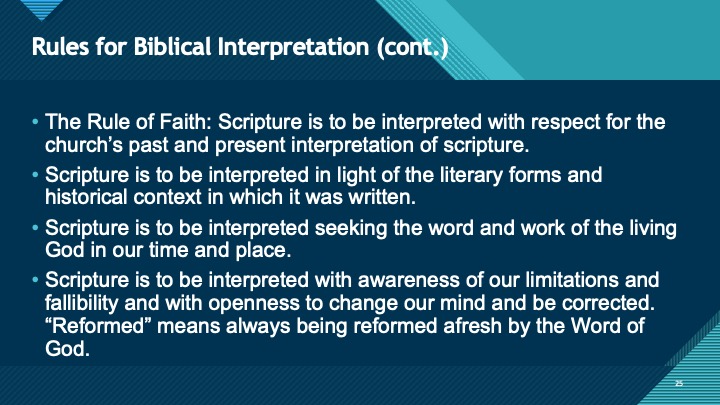

Know Your Bible Class 04
Links
< Home Page > < Top of Page >
Know Your Bible Week 4 Text
Know Your Bible 04 Text
KNOW YOUR
BIBLE
WEEK FOUR
The Authority and Interpretation of Scripture
The PCUSA Book of Confessions
What are the Confessions?
• Part 1 of the Constitution of the PCUSA (Part 2 being the Book of Order)
• Confessions declare who church is, what it believes, and what it resolves to do
• Confessions guide the church in study and interpretation of Scriptures
• Confessions summarize essence of Reformed doctrine
• Each confession emerged in particular time and place in response to particular historical situation
The PCUSA’s Confessions
• The Nicene Creed
• The Apostles’ Creed
• The Scots Confession *
• The Heidelberg Catechism
• The Second Helvetic Confession *
• The Westminster Confession of Faith *
• The Shorter Catechism
• The Larger Catechism
• The Theological Declaration of Barmen *
• The Confession of 1967 *
• The Confession of Belhar
• A Brief Statement of Faith– Presbyterian Church (U.S.A.)
* To be discussed!
Scots Confession (1560): The Interpretation of Scripture
• Statement of Protestant Christian faith written by John Knox and five other prominent ministers during reign of Catholic Mary Queen of Scots
• We affirm that in these [the canonical OT and NT] all things necessary to be believed for the salvation of man are sufficiently expressed. The interpretation of Scripture, we confess, does not belong to any private or public person, nor yet to any Kirk for pre-eminence or precedence, personal or local, which it has above others, but pertains to the Spirit of God by whom the Scriptures were written. When controversy arises about the right understanding of any passage or sentence of Scripture, or for the reformation of any abuse within the Kirk of God, we ought not so much to ask what men have said or done before us, as what the Holy Ghost uniformly speaks within the body of Scriptures and what Christ Jesus himself did and commanded.
Scots Confession (1560): The Interpretation of Scripture (cont.)
• For it is agreed by all that the Spirit of God, who is the Spirit of unity, cannot contradict himself. So if the interpretation or opinion of any theologian, Kirk, or council is contrary to the plain Word of God written in any other passage of the Scripture, it is most certain that it is not the true understanding and meaning of the Holy Ghost, although councils, realms , and nations have approved and received it. We dare not receive or admit any interpretation which is contrary to any principal point of our faith, or to any other plain text of scripture, or to the rule of love.
(from Chapter XVIII)
Scots Confession (1560): The Authority of the Scriptures
• As we believe and confess the Scriptures of God sufficient to instruct and make perfect the man of God, so do we affirm and avow their authority to be from God, and not to depend on men or angels. We affirm, therefore, that those who say the Scriptures have no other authority save that which they have received from the Kirk are blasphemous against God and injurious to the true Kirk, which always hears and obeys the voice of her own Spouse and Pastor, but takes not upon her to be mistress over the same.
(Chapter XIX)
Second Helvetic Confession (1566)
• Written by Heinrich Bullinger, Swiss theologian and pastor for 44 years at Grossmunster in Zurich
• Most personal and pastoral of Reformed confessions; concerned to relate interpretation of Scripture and Christian faith to everyday life of Christians and the church
• Emphasis on preaching; reflects Bullinger’s practical concern about how Scripture actually functions in faith and life of Christians when it is faithfully interpreted, proclaimed, and heard
Second Helvetic Confession: Of the Holy Scripture Being the True Word of God (Ch.1)
Canonical Scripture
We believe and confess the canonical Scriptures of the holy prophets and apostles of both Testaments to be the true Word of God, and to have sufficient authority of themselves, not of men. For God himself spoke to the fathers, prophets, apostles, and still speaks to us through the Holy Scriptures.
And in this Holy Scripture, the universal Church of Christ has the most complete exposition of all that pertains to a saving faith, and also to the framing of a life acceptable to God; and in this respect it is expressly commanded by God that nothing be either added to or taken from the same.
Second Helvetic Confession: Of the Holy Scripture Being the True Word of God (Ch.1)
The Preaching of the Word of God Is the Word of God. Wherefore when this Word of God is now preached in the church by preachers lawfully called, we believe that the very Word of God is proclaimed, and received by the faithful; and that neither any other Word of God is to be invented nor is to be expected from heaven: and that now the Word itself is preached is to be regarded, not the minister that preaches; for even if he be evil and a sinner, nevertheless the Word of God remains still good and true.
Second Helvetic Confession: Of Interpreting the Holy Scriptures (Ch.2)
The True Interpretation of Scripture
The apostle Peter has said that the Holy Scriptures are not of private interpretation (II Peter 1:20), and thus we do not allow all possible interpretations. Nor consequently do we acknowledge as the true or genuine interpretation of the Scriptures what is called the conception of the Roman Church, that is, what the defenders of the Roman Church plainly maintain should be thrust upon all for acceptance. But we hold that interpretation of the Scripture to be orthodox and genuine which is gleaned from the Scriptures themselves (from the nature of the language in which they were written, likewise according to the circumstances in which they were set down, and expounded in the light of like and unlike passages and of many and clearer passages) and which agree with the rule of faith and love, and contributes much to the glory of God and man’s salvation.
Westminster Confession of Faith (1647)
• Developed in context of English Reformation; Henry VIII, denied a divorce by the Pope, unilaterally created Church of England without reformation
• “Puritans” sought reformation of existing state church; wanted church that was Calvinistic in theology and more Presbyterian in polity
• Produced Westminster Confession and Catechisms, but Church of England remained unreformed
Westminster Confession of Faith (Ch. I)
Of the Holy Scripture
1. Although the light of nature and the works of creation and providence, do so far manifest the goodness, wisdom, and power of God, as to leave men inexcusable; yet they are not sufficient to give that knowledge of God, and of his will, which is necessary unto salvation; therefore it pleased the Lord, at sundry times, and in divers manners, to reveal himself, and to declare that his will unto the Church; and afterwards for the better preserving and propagating of the truth, and for the more sure establishment and comfort of the Church against the corruption of the flesh, and the malice of Satan and of the world, to commit the same wholly unto writing; which maketh the Holy Scripture to be most necessary; those former ways of God’s revealing his will unto his people being now ceased.
Of the Holy Scripture (cont.)
2. [After listing the 39 books of the OT and 27 books of the NT]: All which are given by inspiration of God, to be the rule of faith and life.
3. The books commonly called Apocrypha, not being of divine inspiration, are no part of the canon of Scripture; and therefore are of no authority in the Church of God, nor to be any otherwise approved, or made use of, than other human writings.
4. The authority of the Holy Scripture … dependeth not upon the testimony of any man or church, but wholly upon God….
5. … our full persuasion and assurance of the infallible truth and divine authority [of the Holy Scripture], is from the inward work of the Holy Spirit….
Of the Holy Scripture (cont.)
6. The whole counsel of God, concerning all things necessary for his own glory, man’s salvation, faith, and life, is either expressly set down in Scripture, or by good and necessary consequence may be deduced from Scripture: unto which nothing at any time is to be added, whether by new revelations of the Spirit, or traditions of men….
7. All things in Scripture are not alike plain in themselves, nor alike clear unto all; yet those things which are necessary to be known, believed, and observed, for salvation, are so clearly propounded and opened in some place of Scripture or other, that not only the learned but the unlearned, in a due use of the ordinary means, may attain unto a sufficient understanding of them.
Of the Holy Scripture (cont.)
8. The Old Testament in Hebrew … and the New Testament in Greek … being immediately inspired by God, and by his singular care and providence kept pure in all ages, are therefore authentical; so as in all controversies of religion the Church is finally to appeal unto them. But because these original tongues are not known to all the people of God … therefore they are to be translated into the language of every people unto which they come….
9. The infallible rule of interpretation of Scripture, is the Scripture itself; and therefore, when there is a question about the true and full sense of any scripture (which is not manifold, but one), it may be searched and known by other places that speak more clearly.
Of the Holy Scripture (cont.)
10. The Supreme Judge, by which all controversies of religion are to be determined, and all decrees of councils, opinions of ancient writers, doctrines of men, and private spirits, are to be examined … can be no other but the Holy Spirit speaking in the Scripture.
Theological Declaration of Barmen (1934)
• Declaration: a clarification or explanation of older confessions as applied to a concrete evil that threatened Christians in 1934
• May 29-31, 1934: 139 representatives (clergy and laity) from 18 German provincial churches – Lutheran, Reformed, and United (Lutheran and Reformed) - met in city of Barmen-Wuppertal in northern Germany as First Confessing Synod of the German Evangelical Church
• Protested interference in life of the churches by Nazi government and errors of Nazi-inspired “German Christian” movement
Theological Declaration of Barmen (1934)
• Clarified faith on basis of ancient and Reformation confessions and re-confessed it in new declaration of faith
• Karl Barth, “fortified by strong coffee and one or two Brazilian cigars,” was declaration’s chief author
• 1. “I am the way, and the truth, and the life; no one comes to the Father but by me.” (John 14:6)….
• … Jesus Christ, as he is attested for us in Holy Scripture, is the one Word of God which we have to hear and which we have to trust and obey in life and in death.
• We reject the false doctrine, as though the church could and would have to acknowledge as a source of its proclamation, apart from and besides this one Word of God, still other events and powers, figures and truths, as God’s revelation.
Confession of 1967
• Adopted in context of civil rights movement
• Much of text dedicated to subject of “reconciliation” – between races, nations, economic classes, and in sexual relations
Confession of 1967: The Bible
The one sufficient revelation of God is Jesus Christ, the Word of God incarnate, to whom the Holy Spirit bears unique and authoritative witness through the Holy Scriptures, which are received and obeyed as the word of God written. The Scriptures are not a witness among others, but the witness without parallel….
The New Testament is the recorded testimony of apostles to the coming of the Messiah, Jesus of Nazareth, and the sending of the Holy Spirit to the Church. The Old Testament bears witness to God’s faithfulness in his covenant with Israel and points the way to the fulfillment of his purpose in Christ. The Old Testament is indispensable to understanding the New, and is itself not fully understood without the New.
The Bible is to be interpreted in the light of its witness to God’s work of reconciliation in Christ. The Scriptures, given under the guidance of the Holy Spirit, are nevertheless in the words of men, conditioned by the language, thought forms, and literary fashions of the places and times at which they were written. They reflect views of life, history, and the cosmos which were then current. The Church, therefore, has an obligation to approach the Scriptures with literary and historical understanding. As God has spoken his word in diverse cultural situations, the church is confident he will continue to speak through the Scriptures in a changing world and in every form of human culture.
Rules for Biblical Interpretation in the Reformed Tradition
• Scripture is to be interpreted with confidence in and openness to the guidance of the Holy Spirit.
• The Scripture Principle: Scripture is to be interpreted in light of scripture, with openness to hear the whole Word of God, not just selected parts of it.
• The Christological Principle: Scripture is to be interpreted in light of God’s central self-revelation in Jesus Christ.
• The Rule of Love: Scripture is to be interpreted in light of the one commandment of God that summarizes all other commandments, love for God and for all our neighbors.
• The Rule of Faith: Scripture is to be interpreted with respect for the church’s past and present interpretation of scripture.
• Scripture is to be interpreted in light of the literary forms and historical context in which it was written.
• Scripture is to be interpreted seeking the word and work of the living God in our time and place.
• Scripture is to be interpreted with awareness of our limitations and fallibility and with openness to change our mind and be corrected. “Reformed” means always being reformed afresh by the Word of God.
KNOW YOUR BIBLE
WEEK FOUR